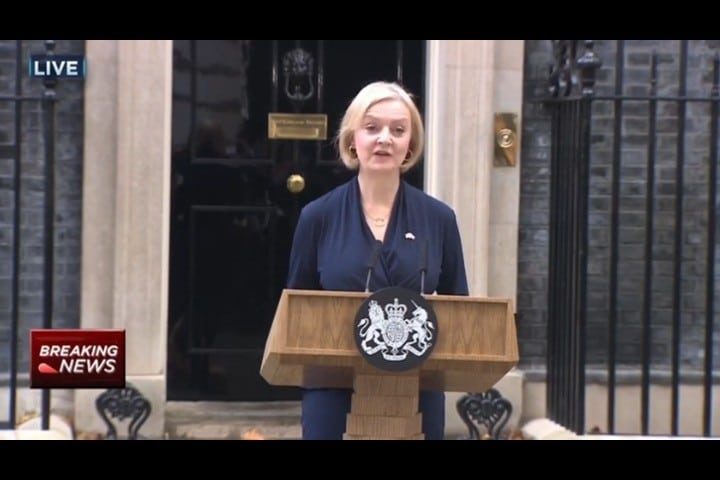
After a tumultuous six weeks featuring the death of Queen Elizabeth and the tanking of the British pound, new U.K. Prime Minister Mary Elizabeth Truss (better known as Liz Truss) has announced that she will resign from that position. Truss took over from previous Prime Minister Boris Johnson after he was forced to resign following a scandal-filled year.
Only a day previous, the new prime minister had referred to herself as a “fighter not a quitter.”
Truss, who won a battle for Conservative (Tory) Party leadership during the summer, resigns as the shortest-tenured prime minister in the United Kingdom’s history. She will remain on until a new prime minister is named sometime in the next week.
“I came into office at a time of great economic and international instability,” Truss told reporters outside of No. 10 Downing Street earlier today. She continued:
Families and businesses were worried about how to pay their bills. Putin’s illegal war in Ukraine threatens the security of our whole continent, and our country has been held back for too long by low economic growth….
We set out a vision for a low tax, high growth economy that would take advantage of the freedoms of Brexit.
I recognize, though, given the situation, I cannot deliver the mandate on which I was elected by the Conservative Party. I therefore have spoken to His Majesty the King to notify him that I am resigning as leader of the Conservative Party.
Dissent within the Tory Party has grown since polls have shown massive support for the opposition Labour Party in the past several weeks.
Former Labour Party leader Jeremy Corbyn wasted no time dancing on Truss’ grave, and Labour Party leader Keir Starmer called for a new “general election, now.”
“After 12 years of Tory failure, the British people deserve so much better than this revolving door of chaos,” Starmer said in a statement. “The British Public deserve a proper say on the country’s future. They must have the chance to compare the Tories’ chaos with Labour’s plans to sort out their mess, grow the economy for working people and rebuild the country for a fairer, greener future.”
Truss’ own party was similarly exasperated with what many see as her failed experiment in leadership.
“I’ve had enough of talentless people putting a tick in the right box not because it’s in the national interest, but because it’s in their own personal interest to achieve ministerial position,” Tory Member of Parliament (MP) Charles Walker told the BBC recently.
More than a dozen Tory MPs have called for Truss to resign in recent weeks, citing botched policies that were causing markets to destabilize.
Truss fired her close ally, Finance Minister Kwasi Kwarteng, only a week ago, and reneged on a pledge to reverse Boris Johnson’s hike of the corporation tax from 19 percent to 25 percent, which many believed would restore approximately £18 billion ($20.1 billion) to the government by 2026.
On October 1, Truss allowed that her plan involved “difficult decisions and does involve disruption in the short term,” but insisted that it was “right for the country.”
With the new PM’s departure, the question becomes: Who will next lead the U.K. government?
Leader of the House of Commons Penny Mordaunt is positioning herself to be considered for the new opening. Mordaunt once held a Cabinet post under PM Theresa May before Boris Johnson replaced her.
On Twitter early this morning, Mordaunt seemed to announce that she was, indeed, interested in the job, with “Penny Mordaunt for PM” tweeting, “This is make or break time. We need to get our act together, deliver for the country and win the next General Election.”
“Only Penny can win us the next General Election,” the tweet announced.
Rishi Sunak, who was initially the front-runner to replace Johnson, is said to be interested in another leadership fight. Many believe that, as former chancellor of the Exchequer under Johnson, Sunak might have the financial expertise that Truss apparently lacked.
There is even speculation that Boris Johnson could make a bid to return to office just six weeks after his resignation. With Tories possibly unwilling to go through another protracted leadership battle, some believe that the former PM could be called upon to lead again for stability’s sake.
But could Johnson, who has been ravaged by scandal after scandal in the past two years, really return “stability” to No. 10 Downing Street?
The U.K. isn’t scheduled for a new general election until 2025. An early election could occur, but isn’t likely considering that the Tories currently hold a 71-seat majority in the House of Commons.



